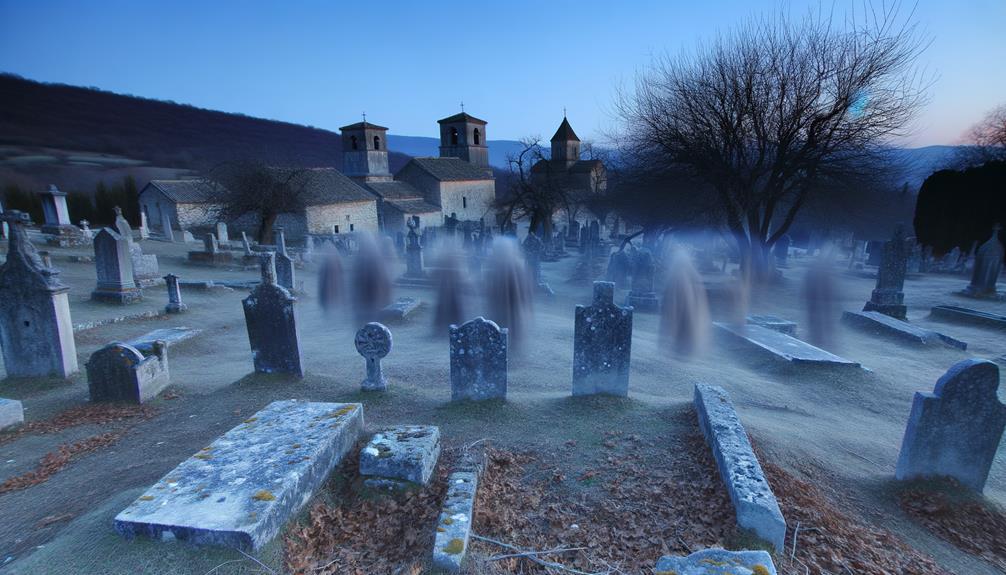The Dead Will Rise From Their Graves Bible Meaning: Explain
The biblical phrase ‘The dead will rise from their graves’ encapsulates the promise of resurrection and eternal life found in key scriptures such as Ezekiel 37:12-14, Daniel 12:2, and John 5:28-29. Historically rooted in Second Temple Judaism and further shaped by early Christian thought, this idea reflects themes of hope, renewal, and divine justice.
Theology presents diverse interpretations, from literal bodily resurrection to symbolic spiritual renewal. This resurrection motif encourages ethical living and reassures believers of the triumph over death through divine power.
To explore the nuanced dimensions of this profound promise, one must consider its broader theological and historical contexts.

The Dead Will Rise From Their Graves: Biblical Meaning and Prophetic Significance
| Prophetic Phrase | Biblical Meaning | Scriptural Insight |
|---|---|---|
| The Dead Will Rise | Physical resurrection of the dead | John 5:28-29; 1 Thessalonians 4:16 |
| Graves Opening | Symbol of divine power over death | Ezekiel 37:12-13; Matthew 27:52 |
| Resurrection of the Righteous | Eternal life for those who believed | Daniel 12:2; Luke 14:14 |
| Resurrection of the Unjust | Judgment for those who rejected God | Acts 24:15; Revelation 20:12-13 |
| Spiritual Renewal | Metaphor for Israel’s restoration and revival | Ezekiel’s vision of dry bones (Ezekiel 37) |
Scriptural Foundations

Frequently cited in theological discussions, the phrase ‘the dead will rise from their graves’ finds its scriptural foundations in various passages throughout both the Old and New Scriptures.
In the Old Covenant, Ezekiel 37:12-14 vividly portrays God’s promise to open graves and bring the deceased back to life, symbolizing Israel’s restoration. Similarly, Daniel 12:2 speaks of a resurrection where many who sleep in the dust will awaken.
Shifting to the New Testament, John 5:28-29 and 1 Thessalonians 4:16-17 emphasize the eschatological resurrection, underscoring Christ’s role in this divine act.
These passages collectively form a theological tapestry that speaks to themes of hope, renewal, and divine justice, offering profound insights into the Judeo-Christian understanding of life, death, and resurrection.
Historical Context

Understanding the historical context of these scriptural passages enhances our comprehension of their theological significance and the cultural milieu in which they were written. Ancient Near Eastern beliefs about the afterlife and resurrection provide a backdrop against which Biblical texts emerged. The interplay between Jewish eschatological expectations and Greco-Roman influences during the Second Temple period shaped the conceptual framework of resurrection.
| Historical Aspect | Description |
|---|---|
| Ancient Near Eastern Beliefs | Concepts of afterlife varied but often included a shadowy existence. |
| Second Temple Judaism | Focused on bodily resurrection as a marker of divine justice. |
| Greco-Roman Influence | Introduced philosophical ideas about the soul and immortality. |
| Apocalyptic Literature | Emphasized end-times scenarios where the dead would rise. |
| Early Christian Thought | Interpreted resurrection in light of Christ’s resurrection. |
This historical lens aids in deciphering the multi-faceted layers of Biblical resurrection themes.
Theological Interpretations

Theological interpretations of resurrection in the Bible are diverse, reflecting a range of perspectives from different religious traditions and doctrinal viewpoints.
Within Christianity, beliefs about bodily resurrection vary; some denominations emphasize a literal physical resurrection, while others interpret it more metaphorically.
Judaism, particularly in apocalyptic literature, also presents varied views, ranging from literal revivification to more spiritual understandings of life after death.
Islamic theology, meanwhile, asserts a clear belief in bodily resurrection on the Day of Judgment. These interpretations fundamentally shape eschatological expectations and ethical behaviors among adherents.
Consequently, the concept of the dead rising from their graves is not monolithic but subject to nuanced theological discourse that considers scriptural, historical, and doctrinal contexts.
Symbolic Meaning

The concept of the dead rising from their graves in biblical literature can be viewed as a profound metaphor for spiritual renewal and the ultimate triumph over mortality.
This symbolism extends beyond literal resurrection, encapsulating the transformative power of faith and the promise of eternal life.
Spiritual Renewal Symbolism
Frequently interpreted through a lens of spiritual renewal, the phrase ‘the dead will rise from their graves’ often symbolizes a profound transformation or rebirth within the human soul.
This metaphorical resurrection can be seen as an awakening from a state of spiritual dormancy or moral decline, suggesting an emergence into a higher state of consciousness or ethical living.
The imagery of rising from graves encapsulates the shedding of old, destructive patterns and the embracing of new, life-affirming values.
In theological discourse, this concept aligns with themes of repentance, redemption, and the ongoing process of sanctification.
Consequently, ‘the dead rising’ serves as a powerful symbol for personal renewal, encouraging individuals to transcend their former selves and embody a spiritually enlightened existence.
Victory Over Death
In exploring the symbolic meaning of ‘victory over death,’ one investigates the profound theological assertion that death is not the ultimate end but rather a passage to a transcendent existence. This concept finds its roots in scriptural promises of resurrection and eternal life, thereby conveying a message of hope and continuity beyond physical demise.
Symbolically, ‘rising from the graves‘ serves as a powerful metaphor for overcoming mortal limitations and entering a divine, imperishable domain. Theologically, it underscores the triumph of divine power over the finality of death, offering believers a vision of ultimate redemption and renewal.
This victory is not merely about life after death but signifies a deeper, spiritual conquest over sin and separation from God.
Modern Perspectives

Contemporary interpretations of biblical resurrection often reflect diverse theological, cultural, and scientific viewpoints.
Theologically, some scholars argue that resurrection symbolizes spiritual renewal rather than a literal rising, aligning with metaphorical understandings of scripture.
Culturally, modern perspectives are influenced by varying traditions; for instance, Western Christianity may emphasize physical resurrection, while Eastern Orthodoxy might focus on the transformative aspect of the soul.
Scientifically, advancements in genetics and cryonics introduce complex questions about the feasibility of life after death, provoking intriguing intersections between faith and empirical evidence.
These multifaceted interpretations underscore the complexity in reconciling ancient biblical texts with modern existential queries, illustrating a dynamic interplay between enduring religious beliefs and contemporary intellectual discourse.
Impact on Christian Beliefs

The notion of the dead rising from their graves holds profound implications for Christian doctrine, particularly in relation to the concepts of resurrection and salvation.
This belief reinforces the promise of eternal life and serves as a cornerstone for eschatological expectations, particularly the revelations associated with Judgment Day.
Consequently, these elements underpin the moral and existential framework within which many Christians navigate their faith and actions.
Resurrection and Salvation
Christian beliefs regarding resurrection and salvation fundamentally shape the theological understanding of life, death, and the afterlife. These doctrines assert that resurrection is a pivotal event in God’s redemptive plan, offering believers assurance of their own future resurrection. The salvation narrative underscores the necessity of faith in Christ’s atoning sacrifice, thereby linking resurrection directly to the promise of eternal life.
| Aspect | Resurrection | Salvation |
|---|---|---|
| Theological Basis | Central event in Christian eschatology | Faith in Christ’s atonement |
| Biblical Reference | 1 Corinthians 15:52 | John 3:16 |
| Key Belief | Bodily resurrection of believers | Redemption and forgiveness of sins |
| Impact | Assurance of eternal life | Transformation of moral and spiritual life |
This interconnection profoundly influences Christian ethics, worship, and eschatological hope.
Eternal Life Promises
Building upon the foundational concepts of resurrection and salvation, the promises of eternal life profoundly shape the contours of Christian doctrinal and existential outlooks. These promises instill a sense of hope and purpose, reinforcing the belief in a transcendent destiny beyond earthly existence. The anticipation of eternal communion with the Divine fosters a transformative ethical framework, guiding believers towards a life of virtue and compassion.
- Hope for Reunion: The promise of eternal life offers solace with the prospect of reuniting with loved ones.
- Moral Imperative: It urges adherence to moral principles, knowing life has eternal consequences.
Such promises elevate the spiritual journey, forming the bedrock of Christian faith and practice.
Judgment Day Revelations
Judgment Day revelations fundamentally influence Christian eschatology, shaping theological perspectives on divine justice and moral accountability.
These revelations, primarily drawn from apocalyptic scriptures such as Revelation and Daniel, underscore the culmination of history where all individuals face divine adjudication.
This eschatological event is pivotal in reinforcing the moral imperatives central to Christian doctrine, emphasizing repentance, righteousness, and the inevitability of divine retribution.
The imagery of the dead rising from their graves symbolizes not only physical resurrection but also the ultimate reckoning of human actions.
Consequently, this belief profoundly affects Christian ethics, urging adherents to live in anticipation of an eventual, incontrovertible divine judgment, thereby sustaining a life oriented towards spiritual and moral rectitude.
Conclusion
The phrase ‘the dead will rise from their graves’ is a multifaceted concept within Christian theology, rooted in scriptural foundations, historical context, and symbolic meanings.
Its interpretations have evolved over time, impacting modern perspectives and deeply ingraining itself in Christian beliefs.
Like a tapestry woven with threads of faith and eschatology, this idea continues to provoke contemplation and inspire hope in the promise of resurrection and eternal life.






